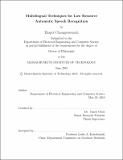| dc.contributor.advisor | James Glass. | en_US |
| dc.contributor.author | Chuangsuwanich, Ekapol | en_US |
| dc.contributor.other | Massachusetts Institute of Technology. Department of Electrical Engineering and Computer Science. | en_US |
| dc.date.accessioned | 2016-12-05T19:11:04Z | |
| dc.date.available | 2016-12-05T19:11:04Z | |
| dc.date.copyright | 2016 | en_US |
| dc.date.issued | 2016 | en_US |
| dc.identifier.uri | http://hdl.handle.net/1721.1/105571 | |
| dc.description | Thesis: Ph. D., Massachusetts Institute of Technology, Department of Electrical Engineering and Computer Science, 2016. | en_US |
| dc.description | This electronic version was submitted by the student author. The certified thesis is available in the Institute Archives and Special Collections. | en_US |
| dc.description | Cataloged from student-submitted PDF version of thesis. | en_US |
| dc.description | Includes bibliographical references (pages [133]-143). | en_US |
| dc.description.abstract | Out of the approximately 7000 languages spoken around the world, there are only about 100 languages with Automatic Speech Recognition (ASR) capability. This is due to the fact that a vast amount of resources is required to build a speech recognizer. This often includes thousands of hours of transcribed speech data, a phonetic pronunciation dictionary or lexicon which spans all words in the language, and a text collection on the order of several million words. Moreover, ASR technologies usually require years of research in order to deal with the specific idiosyncrasies of each language. This makes building a speech recognizer on a language with few resources a daunting task. In this thesis, we propose a universal ASR framework for transcription and keyword spotting (KWS) tasks that work on a variety of languages. We investigate methods to deal with the need of a pronunciation dictionary by using a Pronunciation Mixture Model that can learn from existing lexicons and acoustic data to generate pronunciation for new words. In the case when no dictionary is available, a graphemic lexicon provides comparable performance to the expert lexicon. To alleviate the need for text corpora, we investigate the use of subwords and web data which helps im- prove KWS spotting results. Finally, we reduce the need for speech recordings by using bottleneck (BN) features trained on multilingual corpora. We first propose the Low-rank Stacked Bottleneck architecture which improves ASR performance over previous state-of-the-art systems. We then investigate a method to select data from various languages that is most similar to the target language in a data-driven manner, which helps improve the eectiveness of the BN features. Using techniques described and proposed in this thesis, we are able to more than double the KWS performance for a low-resource language compared to using standard techniques geared towards rich resource domains. | en_US |
| dc.description.statementofresponsibility | by Ekapol Chuangsuwanich. | en_US |
| dc.format.extent | 143 pages | en_US |
| dc.language.iso | eng | en_US |
| dc.publisher | Massachusetts Institute of Technology | en_US |
| dc.rights | M.I.T. theses are protected by copyright. They may be viewed from this source for any purpose, but reproduction or distribution in any format is prohibited without written permission. See provided URL for inquiries about permission. | en_US |
| dc.rights.uri | http://dspace.mit.edu/handle/1721.1/7582 | en_US |
| dc.subject | Electrical Engineering and Computer Science. | en_US |
| dc.title | Multilingual techniques for low resource automatic speech recognition | en_US |
| dc.type | Thesis | en_US |
| dc.description.degree | Ph. D. | en_US |
| dc.contributor.department | Massachusetts Institute of Technology. Department of Electrical Engineering and Computer Science | |
| dc.identifier.oclc | 963858647 | en_US |
